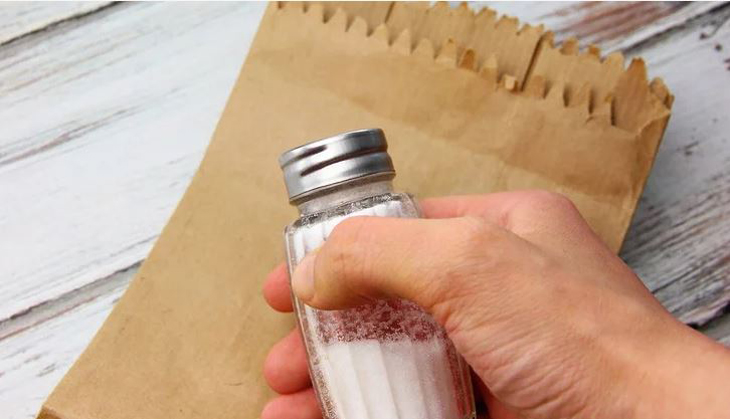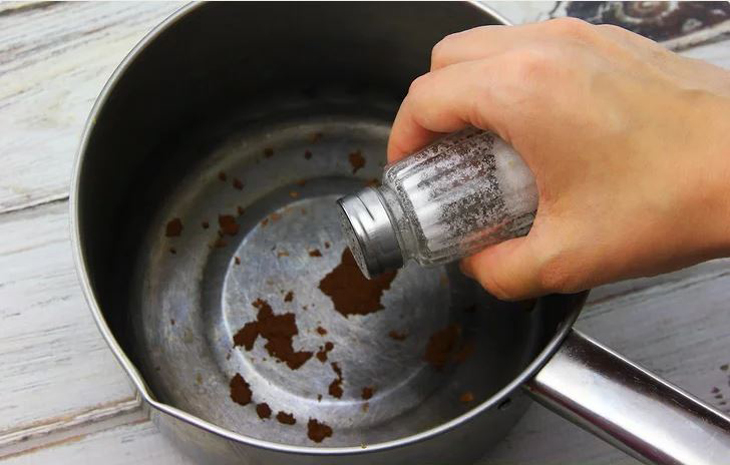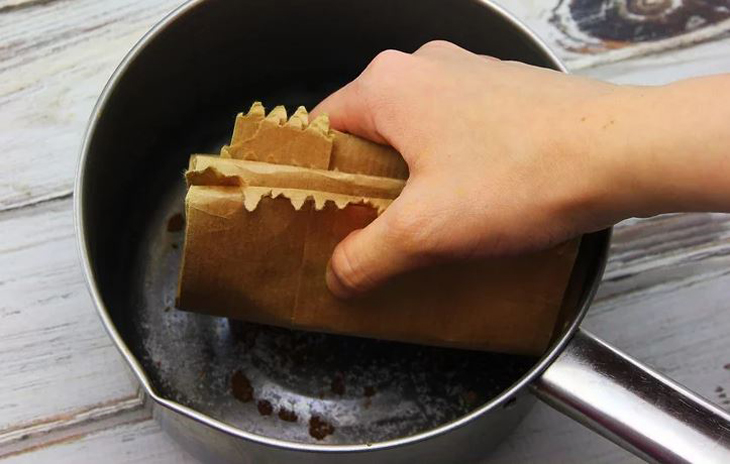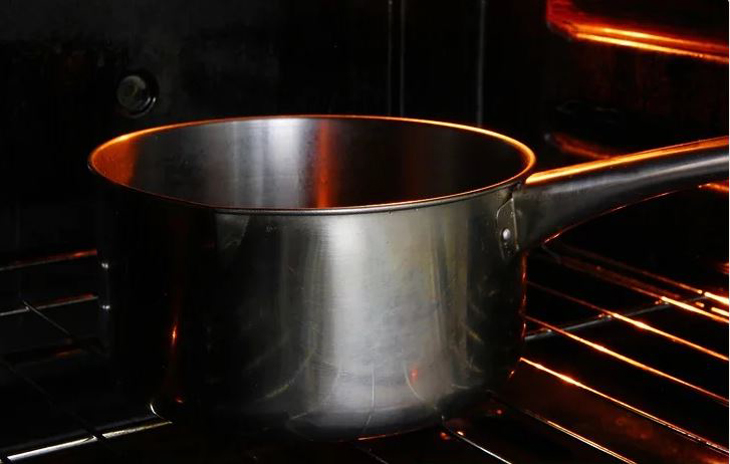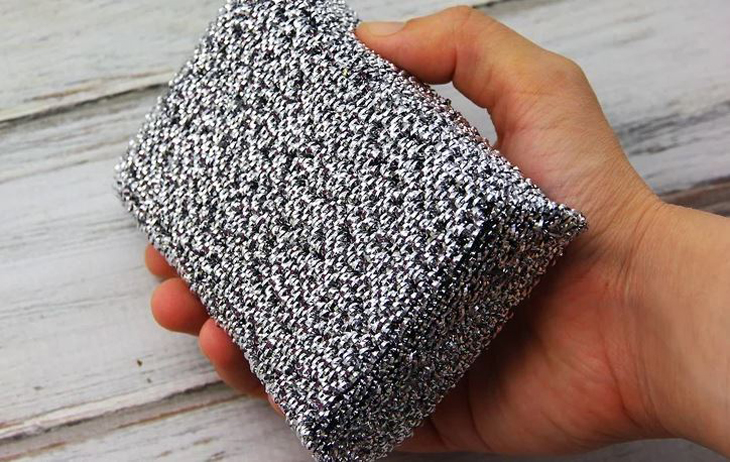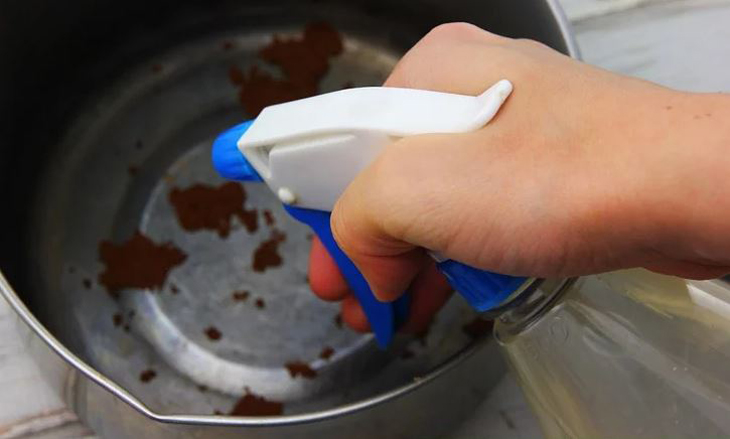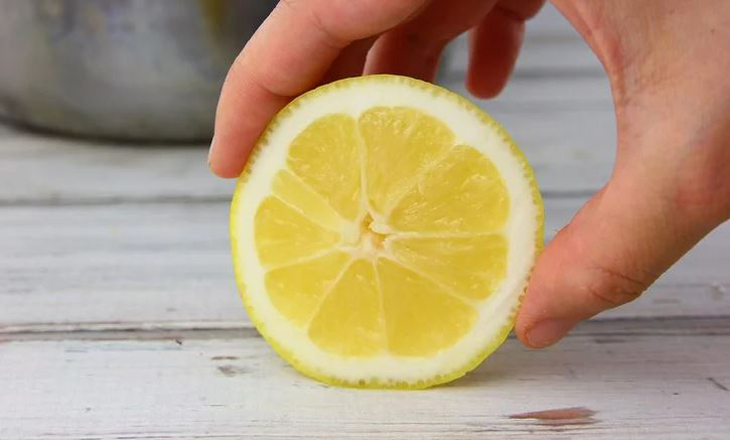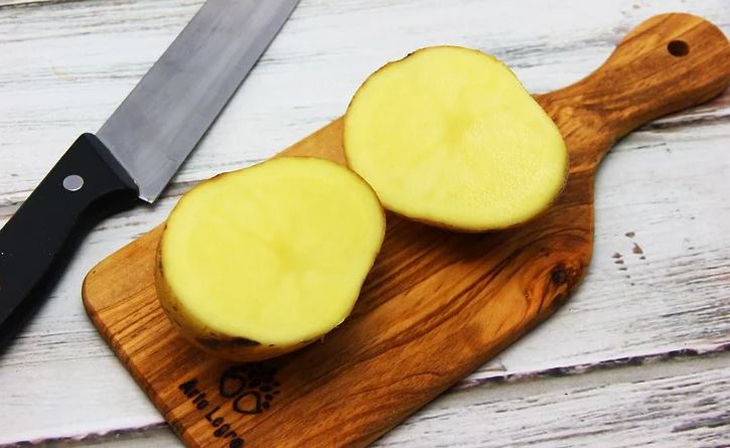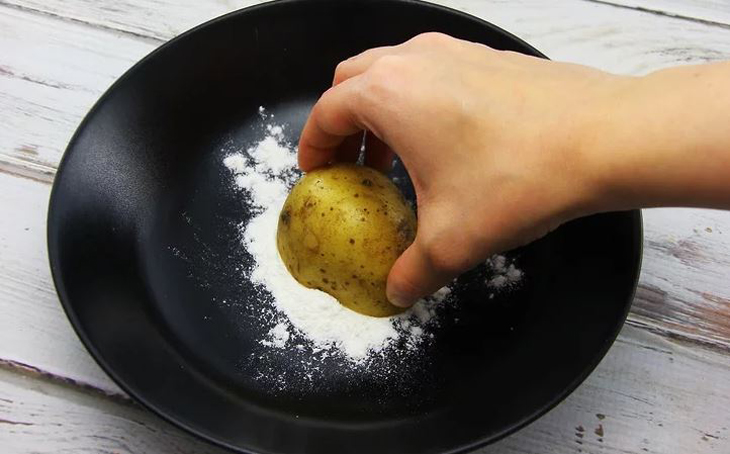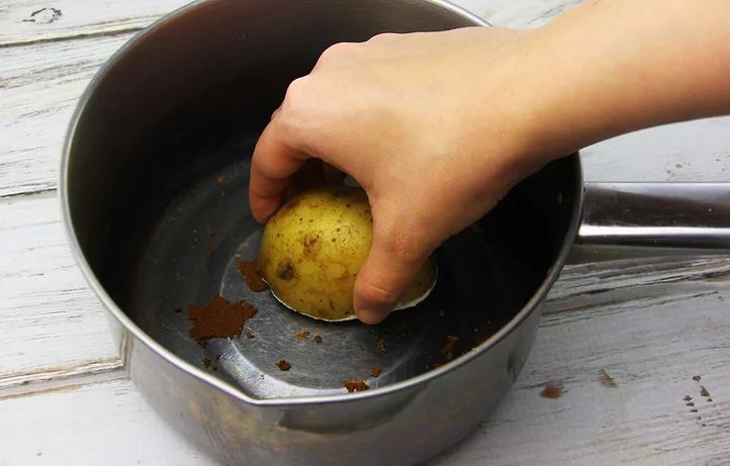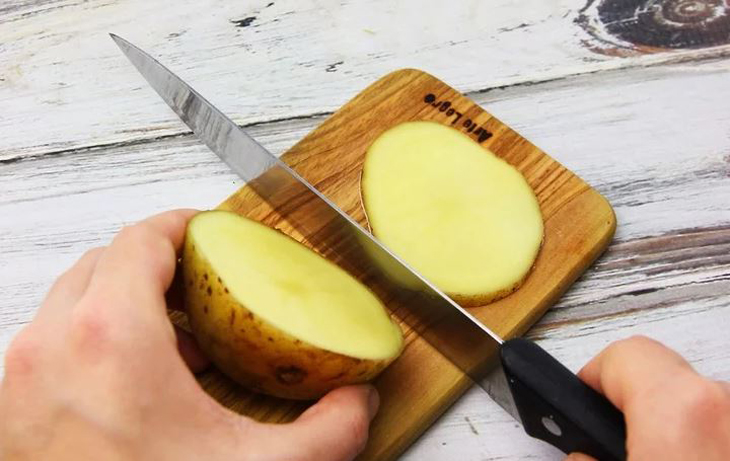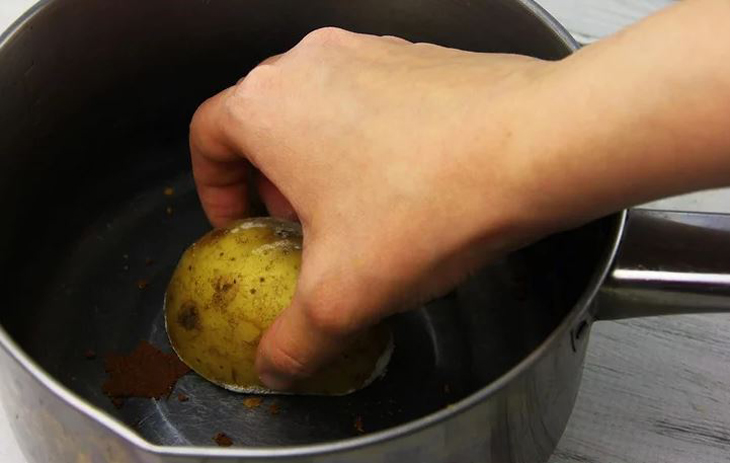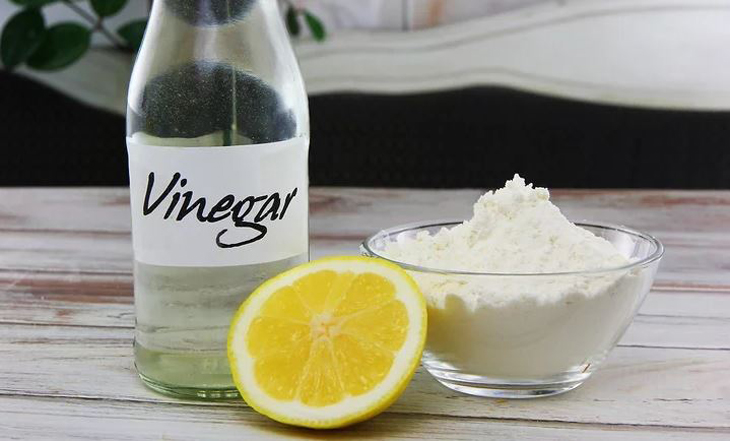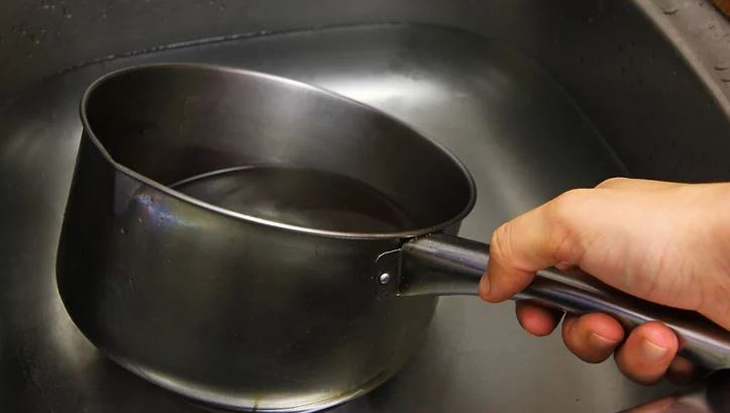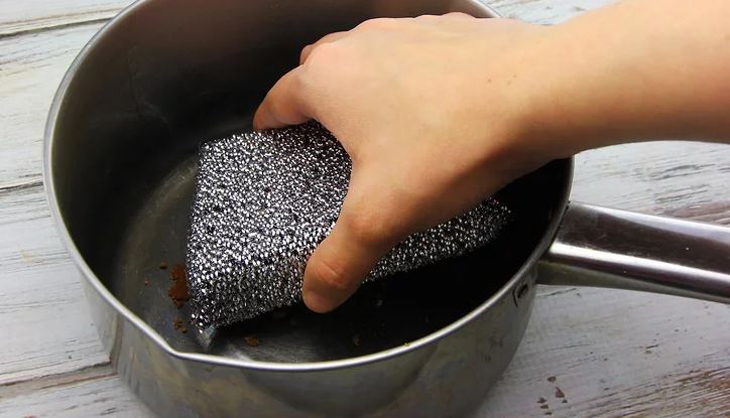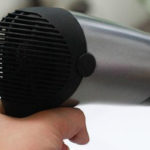Improving the Treatment of Hepatitis B with Metal Salt
- Step 1: Gather salt and a brown paper.
Salt is used as a gentle abrasive to safely remove rust from the pan without causing damage.
Step 2: Sprinkle salt onto the rusty area of the pot or pan, ensuring it is evenly distributed.
- Step 3: Use the brown paper to clean the pot. If the salt becomes dirty from removing rust stains, replace it with fresh salt until the pot is clean.
Step 4:
Add 1 to 2 tablespoons (15 to 30 ml) of vegetable oil or melted grease to the pan. Use a paper towel to spread it evenly over the entire surface.
- If the pan is oven-safe, bake it at 190 degrees Celsius for 1 hour.
- If the pan is not oven-safe, heat the oil in the pan on the stovetop until it sizzles.
- After the pan has cooled, apply a thin layer of oil with a clean paper towel to prepare it for future use.
Removing Dirt from Pots and Pans with a Scouring Pad
- Step 1: Use a steel wool pad with a small amount of dish soap to gently remove rust from the pans and pots.
Step 2: Use mild cleaning agents like Bar Keeper’s Friend for stainless steel surfaces. Combine with a plastic scrubber for effective rust stain removal.
Step 3: Removing Rust
For rust removal, it is recommended to use a rust remover made with natural ingredients. Scrub the pot vigorously to effectively remove rust stains.
If you prefer a natural solution, you can try the following ingredients:
- Combine lemon juice and cream of tartar powder in equal proportions to create a natural rust remover. Mix thoroughly for best results.
- Our fine sand is perfect for various applications including filling sandboxes, creating level surfaces for pavers, and enhancing garden soil. It is made from high-quality deposits and carefully processed for consistent texture and fineness. Trust our fine sand for all your landscaping and construction needs.
Using Potatoes to Heal Skin Wounds
1. Cut the potatoes in half. This gentle method is ideal for removing thin layers of rust.
Step 2: Dip the cut potatoes into a plate of baking soda to coat them.
If baking soda is not available, a small amount of dish soap can be used as a substitute.
- Step 3: Rub the cut surface of a potato on the rusty area. Continue rubbing to remove all rust.
- Thoroughly clean the pan to remove any remaining rust.
Step 4
Once the potatoes have effectively removed all traces of rust, repeat step 2 with a thin slice of potato.
Step 5: Repeat steps 2-5 as needed to completely remove all rust.
Cleaning Your Kitchen Counter with Vinegar or Lemon Water
Step 1: Use a mild acid to remove rust. You can soak the pan or pot overnight in an acid solution to weaken the rust before removing it. Some options include:
-
Grilled Soda and Water
Vinegar
Vinegar – Nature’s Miracle
Vinegar has been used for centuries for its various benefits and applications. It is a natural and eco-friendly solution that can be used for cleaning, cooking, beauty, and more. The acidity of vinegar makes it a powerful agent for removing stains, killing bacteria, and even preserving food.
Uses of Vinegar
- Cleaning: Vinegar can be used as a natural cleaning solution for various surfaces such as countertops, windows, and floors.
- Cooking: Vinegar can be used as a flavorful ingredient in salad dressings, marinades, and sauces.
- Beauty: Vinegar can be used as a natural hair conditioner, facial toner, and foot soak.
- Health: Vinegar has potential health benefits such as aiding digestion and balancing blood sugar levels.
Overall, vinegar is a versatile and affordable product that can be used in many different ways. It is a great addition to any household for its natural and effective properties.
Lemon Juice
Lemon Juice
Lemon juice is a refreshing and versatile citrus beverage that provides numerous health benefits. It is packed with vitamin C, which helps boost the immune system and fight off common illnesses. Additionally, lemon juice is known for its detoxifying properties and ability to aid digestion. It can be enjoyed on its own, used as a natural flavor enhancer in dishes and beverages, or mixed with water as a refreshing drink. Incorporating lemon juice into your diet can add a burst of tangy flavor and provide a range of health benefits. Give it a try and experience the refreshing taste and nourishing effects of lemon juice!
- Step 2: Soak the pan overnight in an acid solution. Dilute the acid with water to reduce its acidity. Adding salt to the solution can enhance its effectiveness.
Step 3: In the morning, gently rub any remaining rust spots. For larger patches of rust, use a scrubbing pad. Lemon peel can be one of the most effective cleaning agents.
These are four effective tips for effortlessly removing rust stains from pots and pans and restoring their spotless condition. We hope you find success in implementing these methods!
Discovering Unusual Ways to Utilize Salt
Table salt: a staple for the kitchen table, and a surprisingly powerful and versatile tool for cleaning, preserving and more! From preventing the discoloration of vegetables to repelling termites to deodorizing shoes, the uses of salt extend far beyond the kitchen.
























